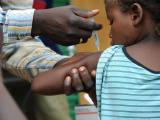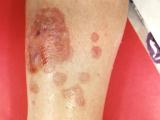Oct 23, 2012 (CIDRAP News) – Eleven more cases were reported in a multistate fungal meningitis outbreak linked to contaminated steroid injections, including the first patient from Georgia, the US Centers for Disease Control and Prevention (CDC) reported today.
The new cases push the outbreak total to 308, but no new deaths were reported, the CDC said. Seventeen states are now affected. Besides back pain, the recalled methylprednisolone acetate injections were also used to treat joint problems, and the CDC reported one more joint infection, raising that total to 4. So far no deaths have been attributed to the joint infections.
The steroid drug came from New England Compounding Center (NECC) in Framingham, Mass., which is under investigation by federal and state authorities.
Yesterday the Food and Drug Administration (FDA) posted new lists of customers who received the recalled steroids from NECC, but it found some technical problems with them and has taken them down. The FDA said it is working to correct the lists and will repost them when the agency can ensure that it is accurate.
When the FDA released the lists yesterday it said the information was from NECC and it couldn't guarantee its accuracy and completeness, but it was making it available as a way to inform facilities and providers who received recalled shipments.
A congressional committee has also launched a probe of the company. Yesterday the House Energy and Commerce Committee sent a letter to NECC and one of its former owners requesting documents related to the current outbreak and some relating to other investigations that have centered on NECC and related business operations, the committee said in a statement yesterday.
The committee said it asked Barry Cadden, NECC's former owner, president, and director of pharmacy, for related documents from his personal e-mail account, after Cadden's attorney told the committee that Cadden would not comply with its Oct 11 request for outbreak briefings.
"While we are disappointed that neither you nor anyone else from the NECC could make themselves available to brief committee staff, the committee must proceed with the investigation. We expect that you will cooperate in this matter," the committee said in its letter.
In a separate letter to Cadden's attorney, the House committee raised concerns about other inspections in 2002 and 2003 that stemmed from an adverse medical event report related to the type of steroid that has been recalled in the current outbreak.
Committee members also raised concerns about how NECC was able to continue distributing bulk supplies of the steroid. In earlier reports, Massachusetts officials said NECC appeared to be operating outside the scope of its license in distributing the steroids.
In other developments, two members of Congress sent a letter to federal health officials on Oct 19 asking them to protect seniors, veterans, and other patients by ensuring the safety of compounded medications, according to an Oct 19 statement from Rep. Rosa DeLauro, D-Conn. The letter, also signed by Rep. Sanford Bishop, D-Ga., was sent to Health and Human Services (HHS) Secretary Kathleen Sebelius and Veterans Affairs (VA) Secretary Eric Shinseki.
In the letter, they said the patient safety issues are critical, especially since VA medical centers purchased products from NECC and a related company, Ameridose.
"Over 250 American patients have become ill including 20 that have died because of contaminated medical products from this one compounding facility," DeLauro and Bishop wrote. "This type of outbreak should be preventable, and we would hope that private insurance companies will take similar steps to protect their patients."
In other developments, Reuters reported that documents obtained under the Freedom of Information Act (FOIA) suggest that the company avoided harsh punishment by regulators in earlier investigations, with problems stretching back to 1999.
According to today's report from Reuters, the Massachusetts pharmacy board in 2004 recommended a 3-year sanction against the company for violating accepted standards for compounding methylprednisolone acetate, the same drug linked to the current outbreak. However, the following year the board agreed to a nondisciplinary settlement, according to Reuters.
In 2004 pharmacists in Iowa and Wisconsin told the board that NECC and Cadden, its chief pharmacist, were soliciting out-of-state prescriptions for office use and using an unapproved form, according to the Reuters story. In the same year a Texas pharmacist aired complaints about other products marketed by Cadden.
NECC said in a statement yesterday that it has worked with the Massachusetts Board of Registration in Pharmacy to resolve any problems that have been brought to the agency's attention, Reuters reported.
See also:
Oct 23 CDC fungal meningitis outbreak update
Oct 22 FDA statement
Oct 22 House Energy and Commerce committee statement
Oct 22 House Energy and Commerce Committee letters
Oct 23 Reuters story


















